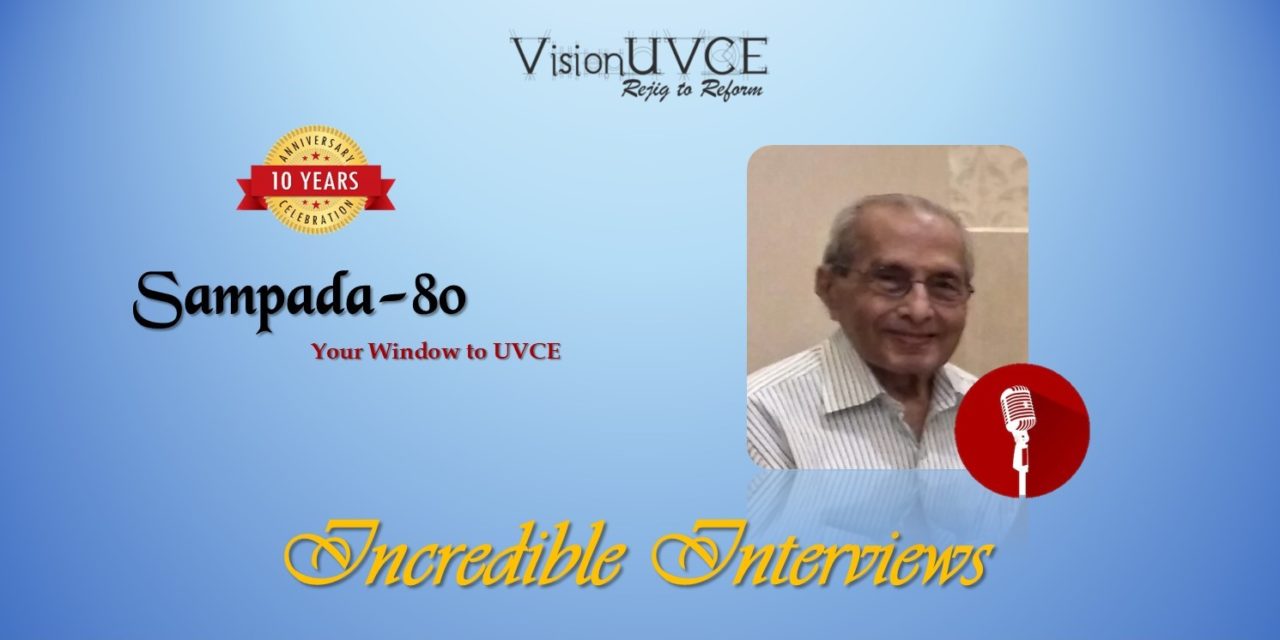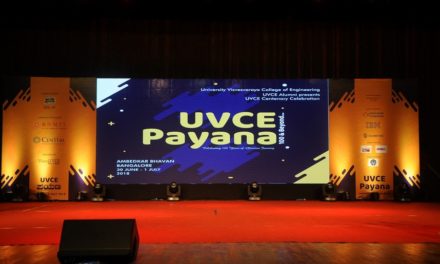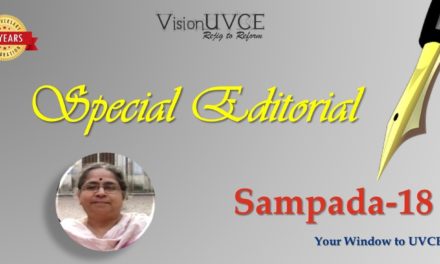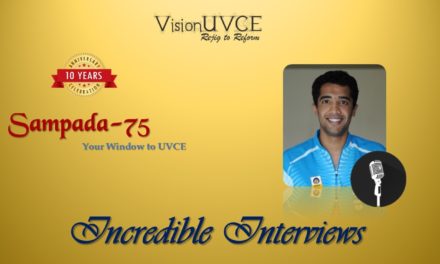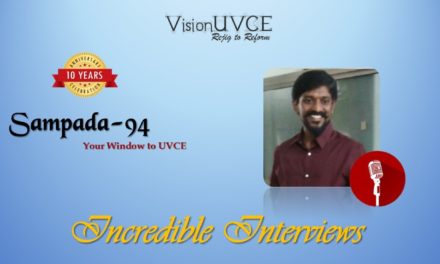Borrowed from SAMPADA old editions – for the 10th Anniversary Special Issue – Interviews section. This one is of AVM Abhaya Kumar, Batch of 1954 EEE.
Team Sampada had the privilege to meet yet another great UVCEian. Abhaya Kumar Sir, Batch of 1954, Electrical served as an Air Vice Marshall. His enthusiasm at this age is so motivating to all youngsters like us. Team Sampada had a great time getting candid with him and talking so many different things and listening to his incredible views. We thank him for taking his precious time and sending us this interview via email. Here are the excerpts from our interview with Abhaya Kumar Sir:
TS : Can you please recollect your college days during 54?
AK: As we began our four year course of study in the year 1950, our batch consisted of about 105 students in the First year of Engineering and comprised of students opting for all the three branches of Engineering: Civil, Electrical and Mechanical. The studies in the First Year were common to all branches. The Second year saw some separation of students of the Civil Engineering Branch from those of the other two branches who continued to have many subjects in common. Third year saw pretty clear separation from the Civil Branch while the Electrical and Mechanical continued to have some common subjects. Fourth year witnessed clear cut separation of all three branches with the Electrical Branch having the smallest class strength. We were about 42 or so. However, we all maintained some common touch with each other. Educational Tours were specifically planned for each branch separately both in the Third Year and the Final Year. They were of great interest since we visited big projects spread all over South India and North India respectively.
Our first Principal was Prof. J.P. Das, followed by Prof. C.G. Gopalakrishna (Civil) and Prof. K. Chennabasavaiah (Elect). We used to have some classes in Maths, Physics and Chemistry for which we sometimes needed to go to Central College. The campus was always active and enjoyed a very friendly environment. Other well remembered names are: Prof DB Narasimhaiah (Civil), Prof BP Gopalakrishna (Mech) Prof WJ Paul Raj (Elect), Prof BK Ramaiah (Civil), Prof KRS Gowda (Civil), Prof V. Byrappa (Elect), Prof YV Aswathanarayana Rao (Elect) Prof DH Reddy (Elect). All of us owe a lot to the above teachers who did a good job of teaching various subjects.
A number of students of our batch joined the then Karnataka Electricity Board and some of them rose to the highest positions like the Chairman, KEB. In fact, I too had the privilege of working in the KEB as a Junior Engineer for a few months before joining the IAF on 08 Aug 1955. I worked in the Frequency Conversion Section of the KEB with its office in KR Circle and later in the Electrical Division of the Vidhana Soudha Construction. I cherish good memories of those days. A few others of our batch joined the Indian Telephone Industries and rose to occupy important positions.
TS : If you compare the college facilities now and then, how would you describe the differences?
AK: Since, over a decade, I have not had any opportunity to go around all the departments at length, it is not possible for me to make any meaningful comments on this aspect. I am sure that the various facilities in all the branches must have definitely been improved considerably as compared to our times when computers were totally unheard of.
TS : How important an event “UVCE Centenary Celebrations” is?
AK: Well, it is a historical event and its importance does not need to be emphasised. Being the very first Engineering College in the state, it merits to be proudly remembered by every one of us-its old students. The number of old students as on date must be in lakhs and the same needs to be proudly announced on the special occasion.
TS : How would you want the Centenary Celebrations to be celebrated in a meaningful way?
AK: The celebrations of such an important event needs adequate planning, preparation, publicity etc, starting from the very beginning of the centenary year. We must ensure that as many of the old students as possible, get to know of it and can therefore make a sincere effort to join the celebrations to the extent possible. It is a great opportunity to get in touch with some of our long lost, old-time classmates/friends and to exchange notes of all the happenings till date. It is also an occasion to get to know the students of the recent batches and to establish a new friendship. We can ill afford to forget the college that made us what we are today.
The events can be spread over a period of about two to four weeks with an inaugural meeting on the first day and a closing ceremony on the last day which can be held in a big auditorium outside the college premises, especially if the expected attendance far exceeds the capacity of the quadrangle space in the college premises itself. It is most important that the heritage building of the College is given an appropriate face-lift befitting the occasion. A tour of the present college, with all its facilities would be a most welcome feature for all the old students and this could be spread over the last TEN DAYS to facilitate all old students to go round in their own time and without crowding up. Sufficient number of volunteers may be enlisted to help the process during those days.
TS : Overall how would you say UVCE has been contributing to society in the past 100 years?
AK: Obviously, the contribution of the UVCE is immense. It is a well known fact that the earliest of the old students were associated with some of the major projects covering irrigation and power sectors besides many other projects all over India. Hence, it is but natural to expect, that the students of the later generation having spread all over the world would have made their names in their own fields of specialty. Hence, by now, the name and fame of our UVCE would be enjoying worldwide reputation. May the glory of the UVCE continue to grow far and wide and even spread to the outer worlds in due time to come.
– AVM Abhaya Kumar, 1954 EEE (From Sampada-80)

